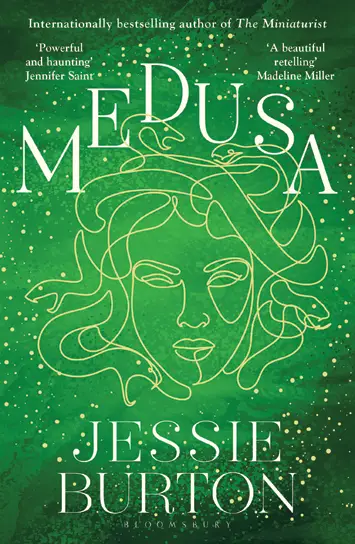Medusa by Jessie Burton – Review

By Barney Bardsley
In Caravaggio’s stark portrait of Medusa, painted in 1597, she is captured at the moment of her beheading, blood dripping from her neck, her mouth and eyes stretched wide in horror, with the infamous snakes writhing around her head. It is a shocking image, and one which impressed Jessie Burton so much, that she vowed one day to write Medusa’s story, and, by implication, avenge her horrible fate.
It is a bold undertaking, to take one of the Greek myths and re-tell it for the modern age, but Burton does so with clarity and gusto. She hones in on two characters: that of Perseus, who has been tasked by Zeus to slay the monster Medusa, by cutting off her head, and Medusa herself – condemned to live on a deserted island, in a curse by the vengeful goddess Athena, following Medusa’s seduction by the sea god Poseidon, amidst the hallowed columns of Athena’s virgin temple. As a spiteful addendum, Athena turns Medusa’s beautiful long dark hair into a ring of live snakes, thus issuing a life sentence of isolation and despair.
Without giving away too much plot here, Burton decides to radically re-fashion the original legend, resulting in an ending that offers Medusa a satisfying – though unintended – vengeance of her own, both on Perseus, and, by association, on all men who seek to harm or despoil the women they profess to love. It is, truly, a tale for the #MeToo era.
 “Too tame”
“Too tame”
But, as anyone who knows even a little about Greek myths will tell you, these legends are dark and fierce and unremittingly punishing. The stuff of living nightmares, the story telling tradition of the ancients is, according to Freud himself, an examination of the human unconscious itself: laid bare, in all its bloody and mysterious symbolism. Jessie Burton’s version of Medusa – which is perhaps the most fearful myth of all – is, for all its inventiveness and verve, simply too tame to fill the ancient footsteps in which she treads. In prose that is, for the most part, plain and functional, the author tells us the tale – but fails to instil in her reader the wonder and awe that makes these epic stories so compelling and unforgettable.
I first came across Jessie Burton’s work in her novel The Miniaturist, an imaginative and intricate story of love and betrayal in seventeenth century Amsterdam, inspired by Petronella Oortman’s gorgeous doll’s house, on display to the public in the Rijksmuseum. it was clear from this debut piece, that Burton could handle a complex plot with style and subtlety. It is the reason I opened Medusa with such hopes of a roller coaster read. But it does not live up to her previous work, and even if, as some reviewers have suggested, this is a book aimed at young adults, it simply does not go dark or deep enough, to fulfil the fateful promise – or curse – of its legendary namesake.
‘Medusa’ by Jessie Burton is published by Bloomsbury, £8.99 paperback









